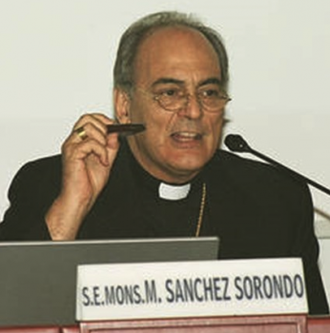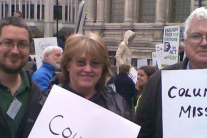Vatican conference on modern slavery and climate change

Bishop Marcelo Sanchez Sorondo
Argentinian Bishop Marcelo Sanchez Sorondo, chancellor of the Pontifical Academy of Sciences, today presented the meeting 'Modern slavery and climate change: the commitment of the cities' and the symposium 'Prosperity, people and planet in the cities' to be held in the Casina Pio IV (Vatican, 21-22 July). These events will be attended by the mayors of major cities, local administrators and various representatives of the United Nations, and the speakers will include expert communications consultants Michael Shank and Alessandro Gaetano.
"The Pontifical Academy of Sciences is in agreement with the Holy Father in perceiving a clear link between these two emergencies: the crisis of climate change and the social crisis, both of anthropic origin", explained the prelate. Our commitment, following the Encyclical, is to ensuring that all society is made aware of these phenomena and of the human responsibilities for these crises, and reacts with firmness, as a new moral imperative for all humanity in favour of the common good".
"In this fundamental moral context, cities and their mayors play a key role", explained the prelate. "Currently, most of humanity is concentrated in formal and informal urban settlements and this trend is set to increase. Each of our cultural traditions also affirms the inherent dignity and the social responsibility of each individual in relation to the common good. They emphasise the importance of living together in the polis for the fulfilment of the social, cultural and religious identity of every human being and for the beauty, wonder and inherent goodness of the world, recognising it as a precious gift that supports life and is entrusted to our stewardship. It is not a matter of preserving it as in a museum, but of developing it according to its potential, following the very laws of nature. Respecting and developing "our common home" rather than devastating it is a moral imperative".
Bishop Sanchez Sorondo noted that, as the Pontifical Academy of Social Sciences has remarked, although the poor and the excluded have the least effect on climate change and often live on the outskirts of the city, they are the most exposed to the terrible threat posed by human-induced climate disruption. However, the world now has within reach the scientific knowledge, technological tools and financial means to reverse anthropogenic climate change, while ending extreme poverty at the same time through solutions that include renewable and low carbon emission energy sources. "Financing the initiative in favour of this 'integral ecology', including the decisive containment of human-induced climate change, could also be based on the relentless pursuit of peace, which would allow a redistribution of public spending from military expenditure towards urgent investments for the benefit of social inclusion and the effective monitoring of carbon emissions, particularly in the cities".
With reference to the presence of mayors at the events on 21 and 22 July, he emphasised that the intention of the Pontifical Academy was for them "to commit to promoting the empowerment of the poor and of those who live in vulnerable conditions in our cities and in our urban settlements, reducing their exposure to extreme weather events caused by radical environmental, economic and social instabilities, which create fertile ground for forced migration and human trafficking".
"At the same time", he added, "we would like the mayors to commit to put an end to abuse, exploitation, human trafficking and all forms of modern slavery within their communities. These tragic occurrences, which Pope Benedict and Pope Francis termed 'crimes against humanity', also include forced labour, prostitution, organ trafficking and domestic servitude. We would also like the mayors to commit to developing resettlement and social integration programmes for the victims, at the national and local levels, in order to avoid their involuntary repatriation".
"In short", he concluded, "we would like our cities and urban settlements to become more socially inclusive, safe, resilient and ecologically integrated".
The studies of the Pontifical Academy for Social Sciences on the impact of climate change can be consulted on-line at www.pas.va

















